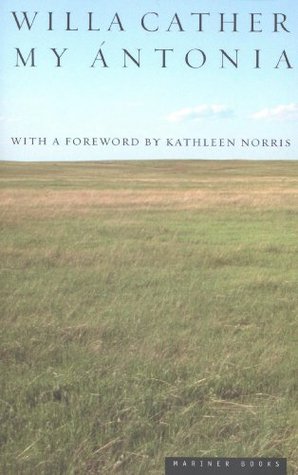More on this book
Community
Kindle Notes & Highlights
The only thing very noticeable about Nebraska was that it was still, all day long, Nebraska.
There was nothing but land: not a country at all, but the material out of which countries are made.
The wagon jolted on, carrying me I knew not whither. I don’t think I was homesick. If we never arrived anywhere, it did not matter. Between that earth and that sky I felt erased, blotted out. I did not say my prayers that night: here, I felt, what would be would be.
As I looked about me I felt that the grass was the country, as the water is the sea. The red of the grass made all the great prairie the colour of wine-stains, or of certain seaweeds when they are first washed up. And there was so much motion in it; the whole country seemed, somehow, to be running.
I can remember exactly how the country looked to me as I walked beside my grandmother along the faint wagon-tracks on that early September morning. Perhaps the glide of long railway travel was still with me, for more than anything else I felt motion in the landscape; in the fresh, easy-blowing morning wind, and in the earth itself, as if the shaggy grass were a sort of loose hide, and underneath it herds of wild buffalo were galloping, galloping. . . .
I wanted to walk straight on through the red grass and over the edge of the world, which could not be very far away. The light air about me told me that the world ended here: only the ground and sun and sky were left, and if one went a little farther there would be only sun and sky, and one would float off into them, like the tawny hawks which sailed over our heads making slow shadows on the grass.
I did not expect anything to happen. I was something that lay under the sun and felt it, like the pumpkins, and I did not want to be anything more. I was entirely happy.
We burrowed down in the straw and curled up close together, watching the angry red die out of the west and the stars begin to shine in the clear, windy sky.
We lay still and did not talk. Up there the stars grew magnificently bright. Though we had come from such different parts of the world, in both of us there was some dusky superstition that those shining groups have their influence upon what is and what is not to be.
THE first snowfall came early in December. I remember how the world looked from our sitting-room window as I dressed behind the stove that morning: the low sky was like a sheet of metal; the blond cornfields had faded out into ghostliness at last; the little pond was frozen under its stiff willow bushes. Big white flakes were whirling over everything and disappearing in the red grass.
There was only—spring itself; the throb of it, the light restlessness, the vital essence of it everywhere: in the sky, in the swift clouds, in the pale sunshine, and in the warm, high wind—rising suddenly, sinking suddenly, impulsive and playful like a big puppy that pawed you and then lay down to be petted.
One result of this family solidarity was that the foreign farmers in our county were the first to become prosperous. After the fathers were out of debt, the daughters married the sons of neighbours—usually of like nationality—and the girls who once worked in Black Hawk kitchens are to-day managing big farms and fine families of their own; their children are better off than the children of the town women they used to serve.
I thought the attitude of the town people toward these girls very stupid. If I told my schoolmates that Lena Lingard’s grandfather was a clergyman, and much respected in Norway, they looked at me blankly. What did it matter? All foreigners were ignorant people who couldn’t speak English. There was not a man in Black Hawk who had the intelligence or cultivation, much less the personal distinction, of Ántonia’s father. Yet people saw no difference between her and the three Marys; they were all Bohemians, all “hired girls.”
The country girls were considered a menace to the social order. Their beauty shone out too boldly against a conventional background. But anxious mothers need have felt no alarm. They mistook the mettle of their sons. The respect for respectability was stronger than any desire in Black Hawk youth.
“I don’t know, something has.” Ántonia tossed her head and set her jaw. “A girl like me has got to take her good times when she can. Maybe there won’t be any tent next year. I guess I want to have my fling, like the other girls.”
The idea of you is a part of my mind; you influence my likes and dislikes, all my tastes, hundreds of times when I don’t realize it. You really are a part of me.” She turned her bright, believing eyes to me, and the tears came up in them slowly. “How can it be like that, when you know so many people, and when I’ve disappointed you so? Ain’t it wonderful, Jim, how much people can mean to each other? I’m so glad we had each other when we were little. I can’t wait till my little girl’s old enough to tell her about all the things we used to do. You’ll always remember me when you think about old
...more


